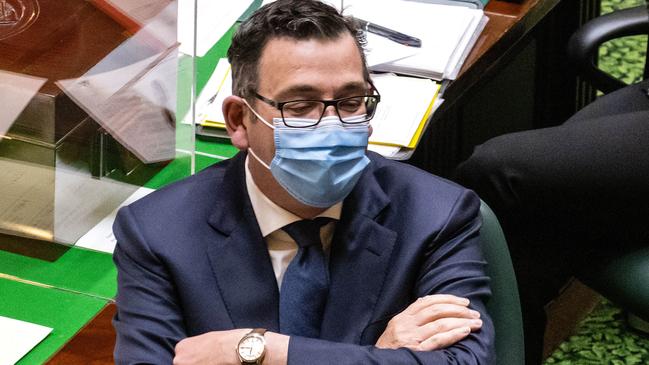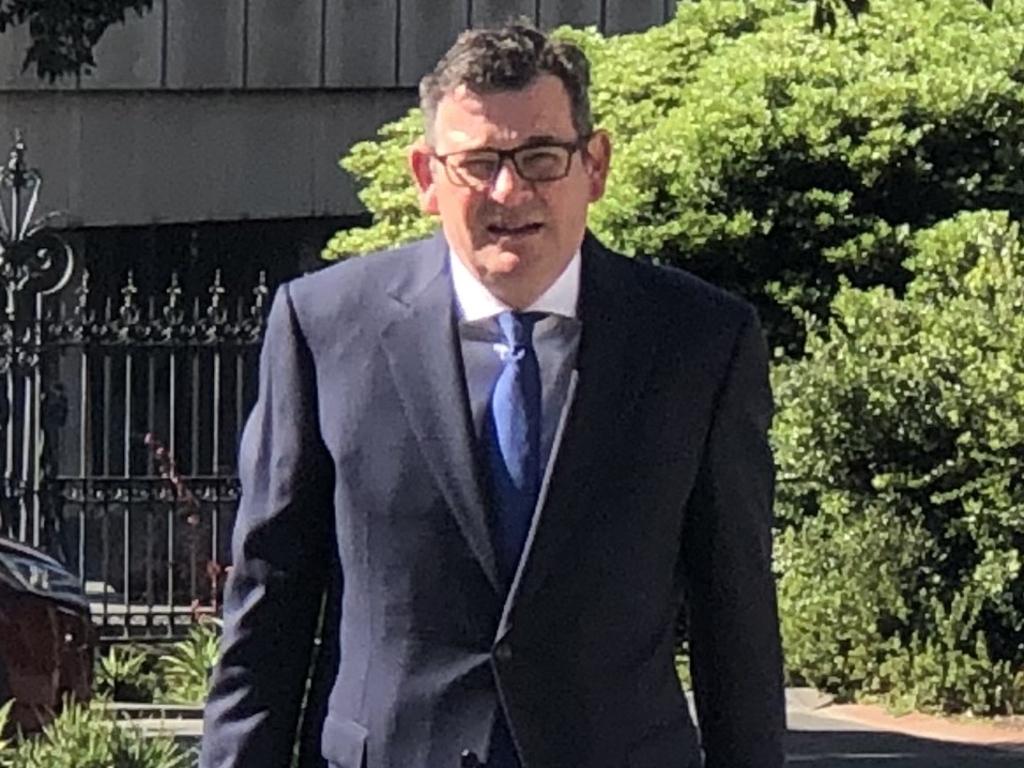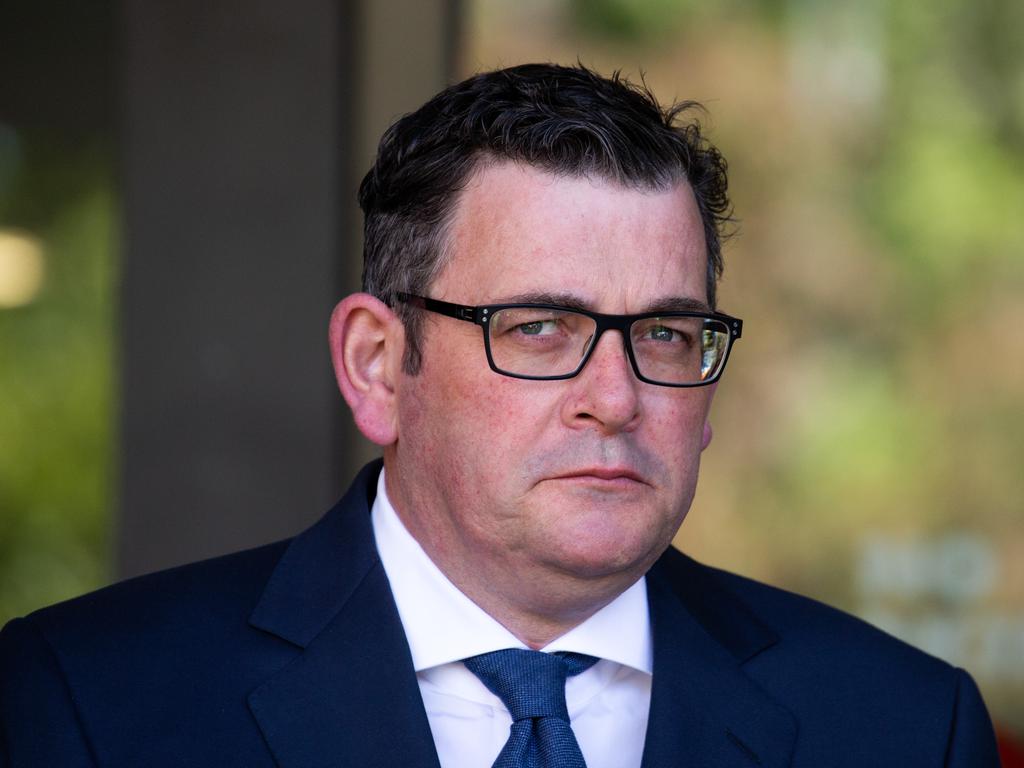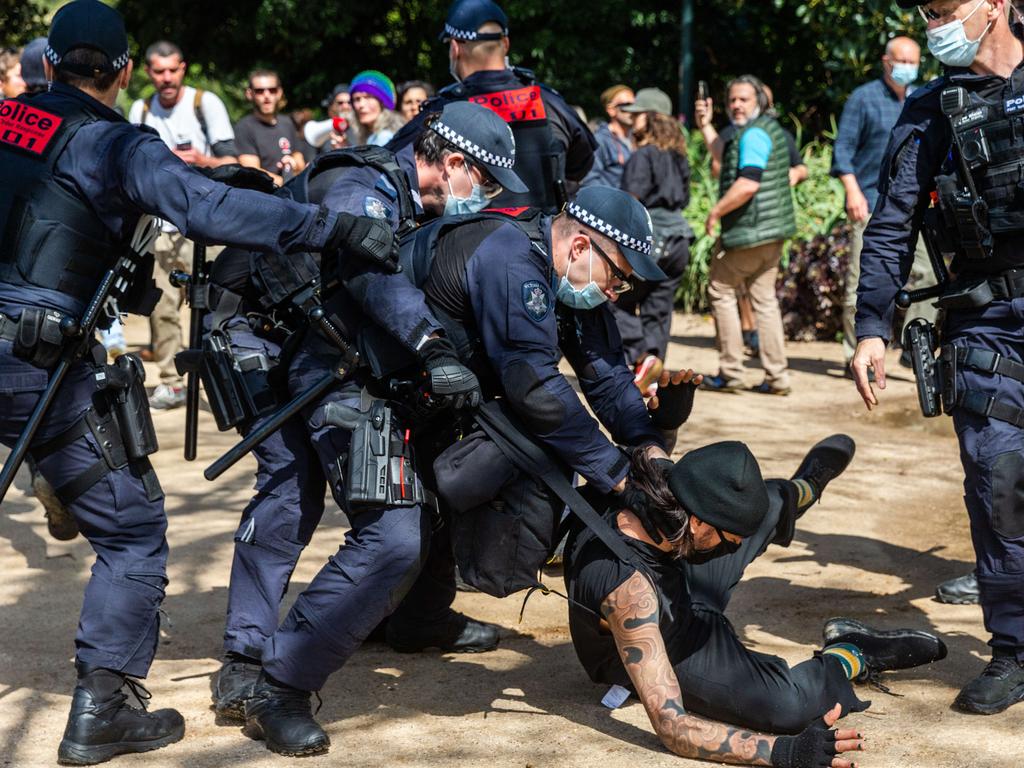Daniel Andrews hit by virus and IBAC crises
Trapped in an unsustainable cycle of fear-based politics, Dan Andrews is misreading the mood. Victorians know the score.

The passing of Gladys Berejiklian’s premiership on the back of an ICAC investigation has supercharged the politics around two IBAC anti-corruption investigations into Dan Andrews’ government in Victoria.
The broader political story, however, is about the compounding effect of an imperfect pandemic response and an ageing government that has, elbows out, crashed through in a style not seen since Jeff Kennett ran Victoria from 1992 to 1999.
Accusations of corrupt behaviour mixed with angst over the pandemic response will add to the pressure on the government’s support.
The more than 18 months of virus mayhem has been like dog years for governments around the world, taking an incredible toll on politicians and bureaucrats as they scramble to deal with the crisis and confront an often bewildered, worn-out, locked-down electorate.
Andrews is misreading the mood. Generally a very strong communicator, he seems trapped in a cycle of fear-based politics that is becoming increasingly unsustainable and unhealthy in a community that knows well the score with the virus.
Victorian Labor has not descended into a state of panic about his government but some smart people are wondering if we are witnessing the beginning of the end of the Andrews era.
The question around Andrews’ future has been asked several times already, starting really with the hotel quarantine fallout in 2020 and his broken back and lengthy absence earlier this year.
This is inevitably a function of being the country’s longest-serving senior political leader, soon to tick over 11 years in the Labor chair. Several of the most senior members of the Andrews cabinet are quietly weighing their futures in the lead-up to the November 2022 election, which will probably be fought on economic recovery.
In many ways, the most important political story facing Victoria is how Andrews intends to manage the generational change in his government on the assumption he wins next year’s election. Once the looming spike in cases wanes, the biggest challenge will be shifting a city-state out of the economic morgue and into the light and who runs this process over the next five years.
For months, Kennett, for one, has been saying the next election is winnable for the Coalition even though the combined Liberal-National parties have only 27 of the 88 lower house seats.
Labor will have increasing difficulties retaining the confidence of the owners of Victoria’s 600,000 small businesses and many of their staff after the relentless lockdown regimen that has crippled the state.
For a combination of reasons, and many relating to the vaccine rollout, Victorians are still weeks away from being released from the lockdown and are watching a health sector that looks to be in a genuine crisis. Which seems unbelievable considering the amount of time the system has been given to prepare for the inevitable spike in virus numbers and the long-running acceptance that population growth puts pressure on hospitals.
Kennett’s very optimistic views on next year’s election gather weight if Anthony Albanese can win the next federal election.
A federal Labor victory would open up Matthew Guy’s opposition to an interesting historical precedent that has lasted since Liberal Dick Hamer was elected in 1973.
The next five changes of government only occurred with the federal government being a different stripe to the successful state government. John Cain in 1982 with Malcolm Fraser as PM, Kennett in 1992 with Paul Keating, Steve Bracks in 1999 with John Howard, Ted Baillieu in 2010 with Julia Gillard and Andrews in 2014 with Tony Abbott.
Victorians like to have rival parties in power in Canberra and Spring Street, and any possible change of government federally could add significant pressure to state Labor.
The anti-vaccination community has also highlighted the increasingly fractious nature of the blue-collar vote, which appears to be becoming less tribal and more prone to move away from the major parties. Just as young professionals, many of whom back Andrews Labor, will be asking the question about who will best set them up for their futures both through careers and home ownership.
Then the anti-corruption story kicks in.
It’s widely accepted that Andrews is a formidable politician but he is at risk of appearing to be – to paraphrase former federal Liberal president Shane Stone’s 2001 memo on the Howard government – mean and tricky.
Assuming IBAC doesn’t find a nuclear-strength fact that destroys Andrews’ leadership, the suggestion of Labor shenanigans mid-pandemic will still be deeply unhelpful politically, adding to that perception of long-running trickiness.
For years Andrews has, teflon-like, deflected suggestions of impropriety around the United Firefighters Union and the overhaul of the Country Fire Authority.
It’s now reported by The Age that Andrews is being investigated by IBAC over the issue but it’s not clear at all whether he is a primary target of the UFU probe or has a cameo role.
Then there’s the second IBAC investigation.
The five weeks of public hearings into whether public money handed to community associations has been misused to fund party political activities and whether government staff have been wrongly engaged to conduct party work will be really challenging for Labor for a couple of reasons.
While it doesn’t appear to target Andrews directly, it will reopen the debate about Labor’s use of public money for improper purposes, as was the case in the so-called red shirts scandal when it was revealed the Andrews government had used electorate staff to work as field organisers in marginal seats even though they are not meant to be used for political work.
The rorting ran to $388,000 but no one was ever charged.
Next week’s IBAC hearings into branch stacking will provide former Andrews minister and Right powerbroker Adem Somyurek a platform to put his side of the story on what happens inside Labor. The sums of money reported by the Herald Sun in the alleged transfers of cash to multicultural groups are small but that won’t take away the principle of the matter.
The public hearings mean that Andrews will end the political year drowning in coronavirus cases and, quite probably, Labor scandal.
Compounding his challenge is that, unlike ICAC, IBAC has not managed to extract a significant political scalp. Leaks about the looming hearings suggest the corruption body is eager for its side of the yarn to be aired pre-emptively.
Andrews did not front Friday’s pandemic press conference, no doubt eager to avoid questions on IBAC and whether or not he should have been wearing his mask earlier in the week.
On a day of record coronavirus cases, it must have been hard to get out of bed.







A sense of political crisis is starting to take hold of the Andrews government amid anti-corruption inquiries, soaring coronavirus cases and a potentially ill-prepared health and ambulance system.